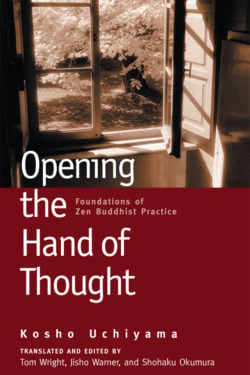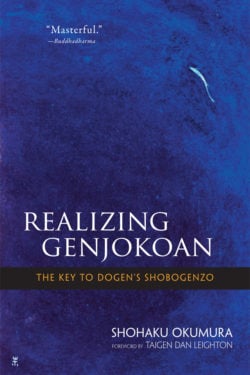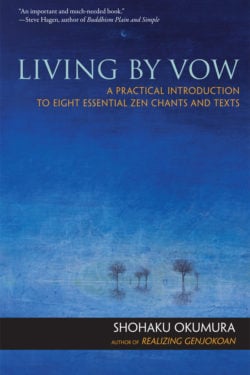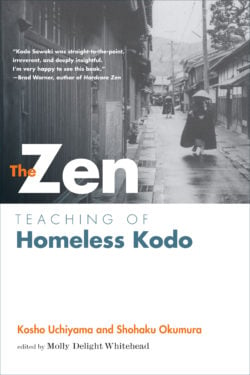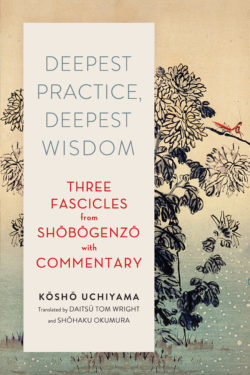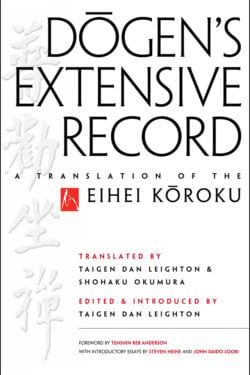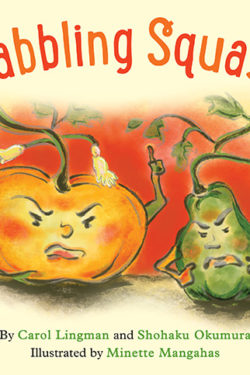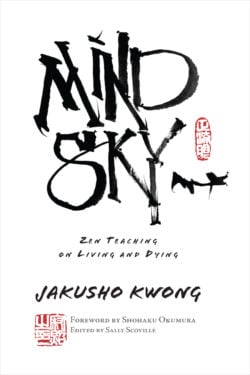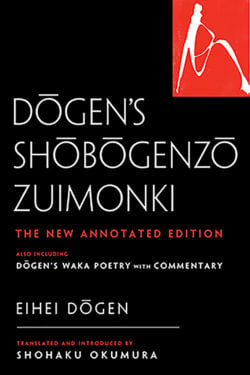Shohaku Okumura

Shohaku Okumura is a Soto Zen priest and Dharma successor of Kosho Uchiyama Roshi. He is a graduate of Komazawa University and has practiced in Japan at Antaiji, Zuioji, and the Kyoto Soto Zen Center, and in Massachusetts at the Pioneer Valley Zendo. He is the former director of the Soto Zen Buddhism International Center in San Francisco. His previously published books of translation include Shobogenzo Zuimonki, Dogen Zen, Zen Teachings of Homeless Kodo, and Opening the Hand of Thought. Okumura is also editor of Dogen Zen and Its Relevance for Our Time; and SotoZen. He is the founding teacher of the Sanshin Zen Community, based in Bloomington, Indiana, where he lives with his family.
Books, Courses & Podcasts
Opening the Hand of Thought
For over thirty years, Opening the Hand of Thought has offered an introduction to Zen Buddhism and meditation unmatched in clarity and power. This is the revised edition of Kosho Uchiyama’s singularly incisive classic.
This new edition contains even more useful material: new prefaces, an index, and extended endnotes, in addition to a revised glossary. As Jisho Warner writes in her preface, Opening the Hand of Thought “goes directly to the heart of Zen practice. . . showing how Zen Buddhism can be a deep and life-sustaining activity.” She goes on to say, “Uchiyama looks at what a person is, what a self is, how to develop a true self not separate from all things, one that can settle in peace in the midst of life.”
By turns humorous, philosophical, and personal, Opening the Hand of Thought is above all a great book for the Buddhist practitioner. It’s a perfect follow-up for the reader who has read Zen Meditation in Plain English and is especially useful for those who have not yet encountered a Zen teacher.
Realizing Genjōkōan
Dōgen, the thirteenth-century Zen master who founded the Japanese Sōtō school of Zen, is renowned as one the world’s most remarkable religious geniuses. His works are both richly poetic and deeply insightful and philosophical, pointing to the endless depths of Zen exploration. And almost precisely because of these facts, Dōgen is often difficult for readers to understand and fully appreciate.
Realizing Genjokoan is a comprehensive introduction to the teachings and approach of this great thinker, taking us on a thorough guided tour of the most important essay—Genjōkōan—in Dōgen’s seminal work, the Shōbōgenzō. Indeed, the Genjōkōan is regarded as the pinnacle of Dōgen’s writings, encompassing and encapsulating the essence of all the rest of his work.
Our tour guide for this journey is Shohaku Okumura, a prominent teacher in his own right, who has dedicated his life to translating and teaching Dōgen.
This volume also includes an introduction to Dōgen’s life from Hee-Jin Kim’s classic, Eihei Dōgen: Mystical Realist, with updated annotations by Okumura.
Living by Vow
This immensely useful book explores Zen’s rich tradition of chanted liturgy and the powerful ways that such chants support meditation, expressing and helping us truly uphold our heartfelt vows to live a life of freedom and compassion. Exploring eight of Zen’s most essential and universal liturgical texts, Living by Vow is a handbook to walking the Zen path, and Shohaku Okumura guides us like an old friend, speaking clearly and directly of the personal meaning and implications of these chants, generously using his experiences to illustrate their practical significance. A scholar of Buddhist literature, he masterfully uncovers the subtle, intricate web of culture and history that permeate these great texts. Esoteric or challenging terms take on vivid, personal meaning, and old familiar phrases gain new poetic resonance.
The Zen Teaching of Homeless Kodo
Eschewing the entrapments of vanity, power, and money, Kodo Sawaki Roshi lived a traveling and “homeless” life, going from temple to temple, student to student, teaching and instructing and never allowing himself to stray from his chosen path. Always clear, often funny, he jolts us into awakening.
Kosho Uchiyama expands and explains his teacher’s wisdom with his commentary, drawing parallels between Zen teachings and Western philosophy. Shohaku Okumura adds his own insight, grounding his teachers’ power and sagacity for the contemporary practitioner. Through this book, experience the timeless, practical wisdom of three generations of Zen masters.
Deepest Practice, Deepest Wisdom
Famously insightful and famously complex, Eihei Dogen’s writings have been studied and puzzled over for hundreds of years. In Deepest Practice, Deepest Wisdom, Kosho Uchiyama, beloved twentieth-century Zen teacher addresses himself head-on to unpacking Dogen’s wisdom from three fascicles (or chapters) of his monumental Shobogenzo for a modern audience.
The fascicles presented here from Shobogenzo, or Treasury of the True Dharma Eye include “Shoaku Makusa” or “Refraining from Evil,” “Maka Hannya Haramitsu” or “Practicing Deepest Wisdom,” and “Uji” or “Living Time.” Tom Wright and Shohaku Okumura lovingly translate Dogen’s penetrating words and Uchiyama’s thoughtful commentary on each piece. At turns poetic and funny, always insightful, this is Zen wisdom for the ages.
Dōgen’s Extensive Record
Eihei Dōgen, the thirteenth-century Zen master who founded the Japanese Sōtō School of Zen, is renowned as one of the world’s most remarkable religious thinkers. As Shakespeare does with English, Dōgen utterly transforms the language of Zen, using it in novel and extraordinarily beautiful ways to point to everything important in the religious life.
He is known for two major works. The first work, the massive Shōbōgenzō (Treasury of the True Dharma Eye), represents his early teachings and exists in myriad English translations; the second work, the Eihei Koroku, is a collection of all his later teachings, including short formal discourses to the monks training at his temple, longer informal talks, and koans with his commentaries, as well as short appreciatory verses on various topics. The Shōbōgenzō has received enormous attention in Western Zen and Western Zen literature, and with the publication of this watershed volume, the Eihei Koroku will surely rise to commensurate stature.
Dōgen’s Extensive Record is the first-ever complete and scholarly translation of this monumental work into English and this edition is the first time it has been available in paperback. This edition contains extensive and detailed research and annotation by scholars, translators and Zen teachers Taigen Dan Leighton and Shohaku Okumura, as well as forewords by the eighteenth-century poet-monk Ryokan and Tenshin Reb Anderson, former abbot of the San Francisco Zen Center—plus introductory essays from Dogen scholar Steven Heine, and the prominent, late American Zen master John Daido Loori.
The Mountains and Waters Sutra
“Mountains and waters are the expression of old buddhas.”
So begins “Sansuikyō,” or “Mountains and Waters Sūtra,” a masterpiece of poetry and insight from Eihei Dōgen, the thirteenth-century founder of the Sōtō school of Zen.
Shohaku Okumura—renowned for his translations of and magisterial teachings on Dōgen—guides the reader through the rich layers of metaphor and meaning in “Sansuikyō,” which is often thought to be the most beautiful essay in Dōgen’s monumental Shōbōgenzō. His wise and friendly voice shows us the questions Dōgen poses and helps us realize what the answers could be. What does it mean for mountains to walk? How are mountains an expression of Buddha’s truth, and how can we learn to hear the deep teachings of river waters? Throughout this luminous volume, we learn how we can live in harmony with nature in respect and gratitude—and awaken to our true nature.
Squabbling Squashes
“A gorgeous, colorful picture book…this read is equally light and profound.”
—Bonnie Nadzam, Lion’s Roar
“It’s true that we are all different squashes . . . some are bigger and some are smaller . . . some are rounder and some are longer. But even if we are different, we are all connected. We are all growing together. We don’t have to be such squabbling squashes.”
Squabbling Squashes is a story for children of all ages about interconnection and learning to live in harmony amid differences, from a leading light of contemporary Zen—based on a parable from Kosho Uchiyama’s classic bestseller Opening the Hand of Thought.
“An essential teaching for all children, told with delightful, relatable warmth.”
—Sumi Loundon Kim, author Sitting Together: A Family-Centered Curriculum on Mindfulness, Meditation, and Buddhist Teachings
“Super enjoyable to hear, read, and savor for people of all ages, Squabbling Squashes helps our future generations to be aware of a universal mutual tie in society and nature.”
—Kazuaki Tanahashi, author of Painting Peace: Art in a Time of Global Crisis
“An ancient tale cultivating mindfulness today.”
—Lauen Alderfer, author of Mindful Monkey, Happy Panda
Mind Sky
“In Zen meditation, anything that comes in your mind will eventually leave, because nothing is permanent. A thought is like a cloud moving across the blue sky. Nothing can disturb that all-encompassing vastness. This is the Dharma.”
In a collection of talks and anecdotes, Jakusho Kwong-roshi, a Dharma successor of Shunryu Suzuki-roshi, presents his approach to Buddhist teaching. Containing photos of Kwong-roshi with his teachers, as well as a selection of his vibrant calligraphy, Mind Sky explores the profound beauty of Zen history and practice, nature, and the philosophy of the ancient Zen master Eihei Dōgen.
With an elegant simplicity, Kwong-roshi shows how Zen is experiential rather than intellectual. And with persistent practice, realization is already yours.
Dogen’s Shōbōgenzō Zuimonki
Discover the teachings of the preeminent Zen Master Dōgen in his own words, written down by his Dharma successor, Koun Ejō. This edition includes both the Shōbōgenzō Zuimonki and translations of and commentary on Dōgen’s luminously evocative waka poetry.
Distinct from Dōgen’s similarly titled magnum opus (simply called the Shōbōgenzō), the Shōbōgenzō Zuimonki can be read as a highly practical manual of Buddhist practice. Consisting of straightforward and accessible teachings and making more limited use of the allusion, wordplay, and metaphor that characterize the essays in the Shōbōgenzō, this work is an essential read for any student of Zen Buddhism. Among the many topics covered, Dōgen especially emphasizes the following points: seeing impermanence, departing from the ego-centered self, being free from greed, giving up self-attachment, following the guidance of a true teacher, and the practice of zazen, specifically shikantaza, or “just sitting.” Additionally, this translation of the Shōbōgenzō Zuimonki has extensive notes, which help to provide you with a new way of approaching the text.
The collection of waka poems included in this volume are a beautiful artistic expression of the Dharma. Rarely seen in this large of a collection or with commentary, this poetry offers unique insight into an important expression of Dōgen’s teachings.
By the spring wind
my words are blown and scattered
people may see them
the song of flowers
These teachings, which have informed teachers and practitioners alike throughout the centuries, will deepen your knowledge, understanding, and experience of the Sōtō Zen tradition.

